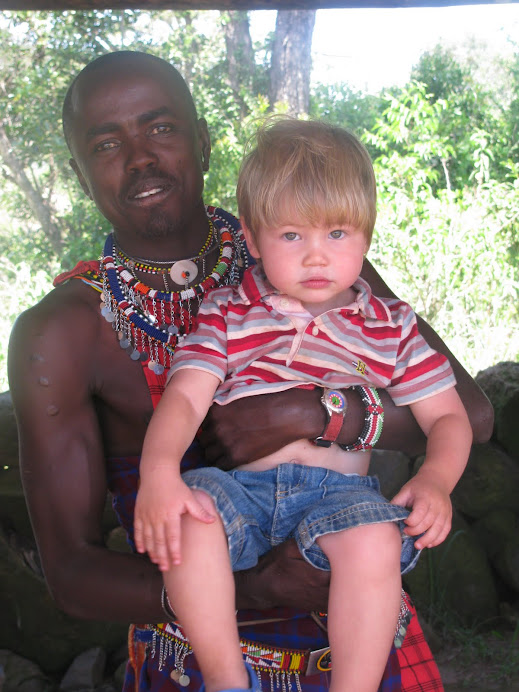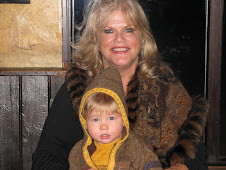I’ve heard for years and years and years about the crossing, and it had taken on for me epic, if not biblical, proportions. Not that I was counting near misses or close calls; those have always been plentiful in my life, but it was true that I’d narrowly escaped catching the migration of wildebeest across a river during the three times I’ve visited the Mara this past season.
Now at Kicheche Bush Camp, a luxury base of six tents nestled in the spare and stark landscape of a whistling thorn forest, we’ve come to visit for several days at the end of the migration season. The Mara, after plentiful rains, was still green, just beginning to turn gold. And while my friends from Alaska, dear friends with big eyes and open hearts and minds like fresh Greek sponges, weren’t prepared for all the wonder they would experience, I was waiting for something to happen. Something I’d never seen before. Cheetah with six cubs on a termite mound nestled underneath an acacia tree; three lion brothers playing bachelor out in the middle of the grasslands; giraffes necking and posing; a hyena chasing three eland and their calves across the horizon at a speed that defies logic. All breathtaking, all splendid, and still, I held back.
Yes, there was enough game to make the most jaded of safari camp travelers sit up and take pause. But it wasn’t until our third day out, way deep into the Mara wilderness, that I woke up.
We hit the Mara River at about noon that Saturday and already a few Land Rovers had gathered – just as hundreds of wildebeest and zebra and antelope had also arrived at the mouth of the river. And the river was as I’d never seen it before – filled with wildebeest carcasses, vultures riding them in the water, taking their pounds of flesh or standing still as storks on the torn backside haunches wedged against log limbs. Hippo snored and bellowed to one another in dark pools. Crocodile, fat and hapless from the thousands of animals who’d already tried to cross and were eaten by them, stretched lazily on the banks, making not a move. They slipped into the water as certain as death might sink, like a stone.
Then it happened, or looked as if it would happen. Two zebra, who’d been dancing along the opposite bank, began bleating and honking to their mates across the river. And they plunged, swimming like all get out, their hooves punishing the water, their legs pushing them through an evil-looking current, the foam cresting and swallowing. The crocodile didn’t budge, but we began to hoot and cheer them on. My three-year-old son Tiger shouted: “Go on, zebwas!” And they made it.
For the next hour and a half, there were several half starts for the hundreds of plains animals loitering with intent. The zebras kept calling across the water to one another, shore to shore; the wildebeest snorted and stamped their feet. An eland, large as a small truck, would tiptoe down the riverbank, stretch its head out over the water and sniff the air, and they appear to flip backwards out of harm’s way. But not one of these substantive creatures was ready to get their feet wet.
Suddenly the herds began shifting and moving along side of us, behind our trucks, to another steeper mouth into the river with stone banks on the opposite side that looked impassable. Four zebra pulled a faint, storming down to the shoreline and at the very last minute, they nearly fell over backwards, listing to the right up a small hippo shute trail back onto the precipice.
I blinked. Tiger sighed, and in that moment of release, my friends from Alaska shouted: “They’re going!” We shipped the Land Rover around and barreled towards the launch pad. I saw one, two, three, then five wildebeest leap, the ultimate leap of faith, into the mighty river as if they were some descendant of Pegasus, flying and landing with a whoosh. And then doing everything in their power to stay upright, afloat, gamely hoofing it towards the sheer cliff they would have to climb in any moment. The zebra not so much followed behind as held their own above the line of wildebeest, now several hundred strong, protected like a shield from any crocodiles who might still be nursing a thirst, or any hungry lions hiding in the thorny underbrush on the opposite shore.
The whole brigade took about seven minutes to make it to safety, or at least, closer to their destination in the Serengetti. Still, there were hundreds more plains animals still lagging behind on the original side of the crossing when one baby wildebeest, not to be left behind, leapt into the raging waters. We all started panting almost at once, Oh, let him make it. C’mon little fella. Fight harder. Go that way! Watch out! He narrowly missed being clobbered by an adult carcass rushing downriver which finally swirled, butt end first, into a pool that gave him footing to climb after his herdmates.
That was my thrill for the trip, my good ride, my talisman.
Then at lunch, the river crossing continued. One of the conservancy’s managers, a distant relative of mine from Ireland, brought his wife over to meet us and talked about how zebra were smarter and shiftier when it came to migration. “They double up with the wildebeest because they know when to go but not where to go, while the zebras know where to go but not when.” Are you sure it’s not the other way around? I asked. “No, the zebras definitely have the edge,” continued Robert. “They often head for the water at breakneck speed as if they’re going to be the first brave mates to cross over, but then slip to the side at the very last moment. By then, the wildebeest are saying to themselves, ‘They’re ready! We’re going!’ And onward they plunge whether it’s safe or not.”
What I saw that afternoon was pure animal, leaping as people do with only faith in their hearts. A metaphor for what I’ve not been doing enough of since I moved to East Africa a year ago.
Wednesday, November 17, 2010
Subscribe to:
Comments (Atom)









